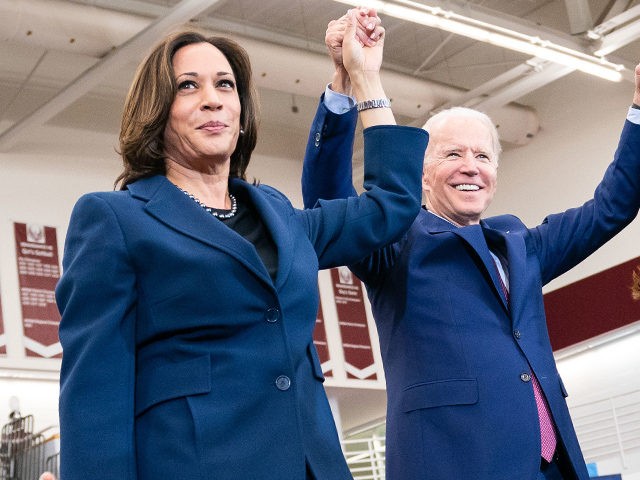Joe Biden’s lead over Donald Trump in the national popular vote in the 2020 presidential election has virtually evaporated just days after the former vice president named Sen. Kamala Harris (D-CA) as his running mate because of a significant decline in support from black and Hispanic voters, according to a poll released by CNN on Sunday evening.
Ten percent of black and Hispanic voters have changed their support from Biden to Trump in just two months.
This decline in support for Biden and increase in support for Trump among black and Hispanic voters has caused Biden’s lead among registered voters to drop from 14 points — 55 percent to 41 percent — in the same nationwide poll conducted for CNN by SSRS in June, to four percent — 50 percent to 46 percent — in the nationwide poll of 987 registered voters conducted for CNN by SSRS between August 12 and August 15. The poll has a margin of error of four percent, which means the race for president is now a statistical tie.
Biden named Harris as his pick for vice president on Tuesday, August 11.
Unlike most polls, when it comes to grouping respondents by race and ethnicity, the CNN/SSRS poll does not distinguish between black and Hispanic voters but puts those two groups together into a single category: people of color.
Among people of color, Biden’s lead over Trump in the June CNN/SSRS poll was a staggering 53 percent, or 74 percent to 21 percent.
In the August CNN/SSRS poll released on Sunday, Biden’s lead over Trump plunged to just 32 percent, or 63 percent to 31 percent.
Of the 74 percent of the respondents who identified as people of color and supported Biden in the June CNN/SSRS poll, ten percent switched from Biden and moved to Trump, increasing his support from 21 percent to 31 percent. An additional one percent of respondents who identified as people of color switched from Biden to undecided.
Trump’s 31 percent support combined among black and Hispanic voters is a significant increase from the level he received from these two groups in the 2016 presidential election.
In that election, Trump garnered 28 percent of the Hispanic vote, compared to Hillary Clinton’s 66 percent, according to Pew Research.
Trump fared even more poorly with the black vote, whereby he obtained the votes of only eight percent of black voters compared to Hillary Clinton’s 80 percent, according to Pew Research.
Since Hispanic voters accounted for 11 percent of voters in 2016, and black voters accounted for 12 percent of voters in the 2016 presidential election, this means that only 17.5 percent of people of color as defined in the CNN/SSRS voted for Donald Trump over Hillary Clinton.
That 17.5 percent support for Donald Trump by people of color in 2016 has now jumped by a whopping 13.5 percent to 31 percent in the August 2020 CNN/SSRS poll.
The CNN/SSRS methodology of combining black voters and Hispanic voters into a single group (people of color) does not allow for a breakdown of this increase in Trump support between the two groups.
If each group increased their support by the same amount, this would mean Trump support among Hispanic voters has jumped from 28 percent in 2016 to 41.5 percent in the August 2020 CNN/SSRS poll, and that Trump support among black voters has jumped from eight percent in 2016 to 21.5 percent in the August 2020 CNN/SSRS poll.
No Republican candidate for president has won more than 20 percent of the black vote since 1960 when Richard Nixon won 32 percent of the black vote in a losing campaign. Four years earlier, in 1956, President Dwight Eisenhower won reelection with 39 percent of the black vote.
Since 1980, the highest percentage of the Hispanic vote won by a Republican candidate for president came in 2004 when President George W. Bush won 40 percent in his successful reelection bid.
If actual voting behavior on Election Day — November 3, 2020 — reflects the results of the August CNN/SSRS poll, Donald Trump could receive support from black voters at a level no Republican presidential candidate has since Richard Nixon in 1960 and support from Hispanic voters at a level no Republican presidential candidate has since George W. Bush in 2004.
Such an outcome would make it extraordinarily difficult for the Democratic ticket of Biden-Harris to defeat Trump-Pence ticket’s bid for reelection in 2020.

COMMENTS
Please let us know if you're having issues with commenting.